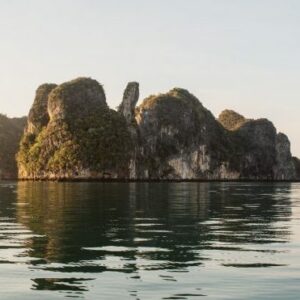There have been many times in my life when I have wished humans could photosynthesize. Hunger and poverty would be things of the past. Of course, we’d also be green and need to lie in sunny spots for most of the day. I like the idea of photosynthesis. I like knowing plants can consume light and make it their own. Say what you will, scientist friends. It still seems like magic to me.
The year I lived in the Pacific Northwest, flora became even more enchanting in the dusk of winter, followed closely by the discovery that trees harbored blossoms beneath their limbs and innocuous patches of dirt held vaults of bright petals. My current home—a small, Southern California apartment—has light enough to grow just a handful of plants. Though I lost several to the saltiness of the air recently, there are enough for me to observe their slow and everlasting climb toward the sun.
In both the southern and northern edges of the United States, I start to get anxious if I don’t go outside. Unfortunately, this cabin fever is easy to ignore. Yes, I feel hemmed in, I think. I’ll pull up Netflix, it seems easier than dealing with the things outside my door. With one click on the screen I can choose apathy over discovery—and isn’t apathy often the easier route?
But easier doesn’t mean better and lately, I’ve had the unshakeable feeling that discovery is calling my name.
As a kid, I made time for my curiosity without even meaning to. There was a house a few blocks over that I was convinced was haunted. It had been empty my whole life, a castle of weeds and stained cherub fountains. Because it was fascinating and frightening, I took the time to ride my bike to its wrought iron fence, press my face between the bars, and spend hours imagining who used to live there. Today I might see the same house and pass it by, thinking, Hm, that’s a beautiful house. Too bad it’s so run down. And that would be the end of it.
Time has morphed into a commodity instead of a gift. If humans really were full of chlorophyll, I suspect we wouldn’t have the patience to lie in the sun all day discovering how photosynthesis works. Our inclination would be to look for sunshine bottled: something to consume in minutes like the next kombucha. I am conscious of time all the time and yet I can’t stop wasting it. Time is too stressful to think about and too easy to fill up. Like a text message from someone I don’t feel like talking to, I try to ignore time’s persistence. If I don’t respond, maybe my phone will stop buzzing.
I want my time back. Or rather, I want to live my time better. I want to arrive at the end of a day and think, “Look what I’ve discovered!” not, “How did I waste three hours on Facebook?”
What if, instead of ignoring or trying to escape time, we renewed it? What if we set aside moments to live as we did when a whole afternoon was available for leaning on the fence of an old house and wondering who used to live there? What if there was time for discovery and wonder, for watching plants unfold their leaves to the sun?
I think there is, and I want to hit the ground walking. I want to get outside and go slow enough to discover what I miss when I am either hurried or apathetic.
Both the limitations of life and the vastness of eternity can become terrifying. I am frantic to accomplish something worthwhile and I am simultaneously immobilized by the size of the task. The thing is, terrifying or not, at the end of the day our time is what we make of it. I could learn something from the orchid on my coffee table, which doesn’t submit a timecard or think about how it should have worked less and slept more. It just grows, slowly and steadily. And when I contemplate this orchid, it cultivates wonder in me and I reclaim a little of the time I’ve lost.


